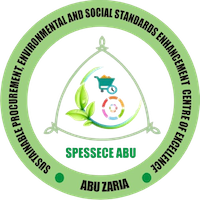
Academic offerings include 95 majors, 86 minors, and more than 100 in-major specializations
The aim of this programme is to produce competent social development experts that would support public and private entities in managing social dimensions of all developmental investment.
The objectives of the programme are to;
Students are to register minimum of two electives for a total of 4 units
| Course Code | Course Title | Course Unit | Status |
|---|---|---|---|
| SODV715 | Social Standards in Social Policy, Planning and Administration | 2 | EL |
| SODV717 | Law and Society | 2 | EL |
| SODV719 | Legal Issues in Social Standards | 2 | EL |
| SODV721 | Social Standards in Emergency and Humanitarian Services | 2 | EL |
This programme is designed to address the skills gap in social development issues associated with procurement and other development and economic growth in Nigeria. This programme shall produce social development experts and equip them with the necessary skills they require to function effectively. It shall also prepare them for higher degrees in Social Development. Furthermore, this programme is also expected to produce competent academics that will fill the manpower gaps in tertiary institutions in Nigeria. It is believed that this programme will be a viable seedling that will produce qualified Social Development practitioners and senior academics who would serve the need of other tertiary institutions offering Social Development Programmes in Nigeria.
The students will be sourced from Social Development Officers, Non-Governmental Officers and middle class Social Development Officer in various Government Ministries, Departments and Agencies at State and Federal levels who will be needing certification and those from other field that want to be professional in Social Development Studies.
Requirements for admission to the programme are as follows:
The duration of the Postgraduate Diploma (PGD) programme will be for a minimum of four (4) semesters.
A candidate must have fulfilled the following conditions to be awarded the Postgraduate Diploma – A candidate must earn a minimum of 28 credit units including 4 credit units of electives in two semesters.
The Course shall be delivered using lecture and presentation approaches via online and physical interaction. Students shall be graded as follows:
The minimum credit load per semester that a student is required to take is 15 credit units.
| Course Code | Course Title | Course Unit | Status |
|---|---|---|---|
| SODV701 | Social Standards Theories | 2 | CR |
| SODV703 | Social Standards and Sustainable Development | 2 | CR |
| SODV705 | Research Methods for Social Standards | 2 | CR |
| SODV707 | History of Social Standards in Nigeria | 2 | CR |
| SODV709 | Gender Development Frameworks | 2 | CR |
| Total | 10 |
| Course Code | Course Title | Course Unit | Status |
|---|---|---|---|
| SODV702 | Advanced Social Standards in Rehabilitation | 2 | CR |
| SODV704 | Standards Practice, Medical and Mental Social Work | 2 | CR |
| SODV706 | Social Standards, Gender and Community Development | 2 | CR |
| SODV708 | Social and Environmental Impact Assessments | 2 | CR |
| SODV710 | Social Institutions and Social Standards | 2 | CR |
| SODV712 | Introduction to Social Statistics | 2 | CR |
| SODV714 | Practicum | 2 | CR |
| Total | 14 |
| Course Code | Course Title | Course Unit | Status |
|---|---|---|---|
| SODV716 | Family, Child and Youth Development | 2 | EL |
| SODV718 | Social Standards in Labour and Employment | 2 | EL |
| SODV720 | Social Standards in Education Sector | 2 | EL |
| SODV722 | Organisation and Administration of Social Welfare | 2 | EL |
| SODV724 | Crimes and Criminal Justice System | 2 | EL |
| SODV726 | Social Standards, Environment and Climate Change | 2 | EL |